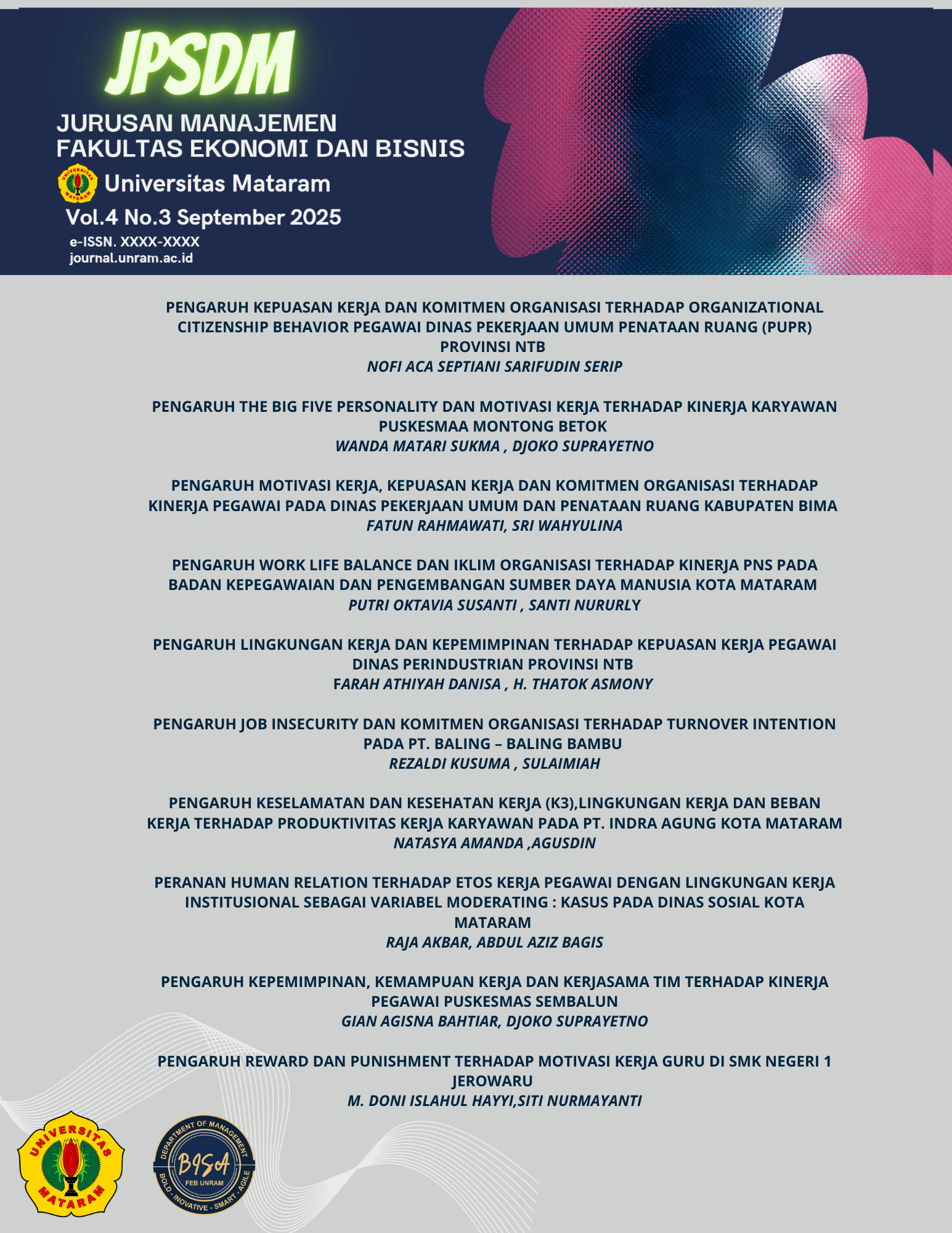PERANAN HUMAN RELATION TERHADAP ETOS KERJA PEGAWAI DENGAN LINGKUNGAN KERJA INSTITUSIONAL SEBAGAI VARIABEL MODERATING :Kasus Pada Dinas Sosial Kota Mataram
Kata Kunci:
Human Relation, Etos Kerja, Lingkungan Kerja, Human Relation, Work Ethic, Work EnvironmentAbstrak
ABSTRAK
Penelitian ini dilakukan untuk mengetahui faktor-faktor yang dapat memengaruhi etos kerja. Penelitian
ini bertujuan untuk menguji secara empiris human relation terhadap etos kerja dengan lingkungan kerja
menjadi variable moderating. Penelitian ini menggunakan data primer dan sekunder yang diperoleh
melalui penyebaran kuesioner kepada responden yang merupakan pegawai dinas sosial kota mataram.
Populasi dalam penelitian ini berjumlah 103 responden. Analisis data yang digunakan adalah teknik
Moderated Regression Analysis (MRA). Analisis linier berganda digunakan untuk melakukan analisis
hubungan antara variabel independen dan dependen. Dalam penelitian ini dilakukan dengan
menggunakan analisis linier berganda dengan Teknik backward elimination menggunakan SPSS 25 for
windows. Hasil analisis statistik pada penelitian ini menunjukkan bahwa : 1) Variabel human relation
melalui efektivitas komunikasi berpengaruh negatif terhadap etos kerja. 2) Variabel human relation
melalui efektivitas pengarahan berpengaruh positif terhadap etos kerja. 3) Variabel human relation
melalui ekspresi sikap saling menghargai berpengaruh positif terhadap etos kerja. 4) Variabel lingkungan
kerja sebagai variabel moderat pada hasil analisis berpengaruh positif dalam pengaruh human relation
melalui efektivitas komunikasi terhadap etos kerja. 5) Variabel lingkungan kerja sebagai variabel moderat
pada hasil analisis berpengaruh negatif dalam pengaruh human relation melalui efektivitas pengarahan
terhadap etos kerja. 6) Variabel lingkungan kerja sebagai variabel moderat pada hasil analisis
berpengaruh positif dalam pengaruh human relation melalui ekspresi sikap saling menghargai terhadap
etos kerja pada pegawai dinas social kota mataram
ABSTRACT
This research was conducted to identify factors that can influence work ethic. The study aimsto empirically
test the effect of human relations on work ethic with the work environment as a moderating variable. This
research uses primary and secondary data obtained through the distribution of questionnaires to
respondents who are employees of the Social Service of Mataram City. The population in this study consists
of 103 respondents. The data analysis technique used is Moderated Regression Analysis (MRA). Multiple
linear regression analysisis used to analyze the relationship between independent and dependent variables.
This research is conducted using multiple linear regression analysis with the backward elimination
technique using SPSS 25 for Windows. The results of the statistical analysis in this study show that: 1) The
human relations variable, through communication effectiveness, has a negative effect on work ethic. 2) The
human relations variable, through direction effectiveness, has a positive effect on work ethic. 3) The human
relations variable, through the expression of mutual respect, has a positive effect on work ethic. 4) The work
environment variable, as a moderating variable in the analysis, has a positive effect on the relationship
between human relations through communication effectiveness and work ethic. 5) The work environment
variable, as a moderating variable in the analysis, has a negative effect on the relationship between human
relationsthrough direction effectiveness and work ethic. 6) The work environment variable, as a moderating
variable in the analysis, has a positive effect on the relationship between human relations through the
expression of mutual respect and work ethic among employees of the Social Service of Mataram City.

